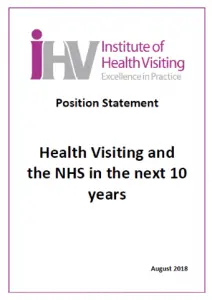We are part of an exciting partnership project (with One Plus One and Best Beginnings) funded by the Department for Work and Pensions (DWP). With our partners we are creating an exciting new evidence-based digital programme which aims to give disadvantaged children the best start in life.

The programme is aimed at helping parents understand the impact of conflict on their babies, learn to cope with life’s stresses and improve communication within their relationships. The stress associated with the transition to parenthood can trigger a significant decline in relationship quality and increase low-level conflict at home. We know that this work fits with the agenda of many Local Authorities and this high-profile national project is a great opportunity for health visitors to further develop their therapeutic working skills alongside parents.
WE NEED YOU!
The programme is being run on a “test-learn-evaluate” strategy adapting an existing module. This is trialling a blended approach where parents will have access to a digital programme guided by health visitors across 3 sessions to maximise impact.
We are offering limited places for health visitors* to train with us as “Relationship Champions”, to be able to use this digital intervention with families in this guided method and share it onwards with their colleagues also. We have already confirmed a number of places but are looking to fill gaps in some areas, e.g. we have places remaining in the North of England currently. Note: we are working to DWP guidance on areas to prioritise in England.
*previous applicants need not apply.
SCHEDULE:
- September 2019 – First training day – one day training in Leeds (17.9.19) or London (18.9.19)
- Testing by participants with 3 families. Planning a date for cascade training in November 2019.
- November 2019 – Second training day – one day training in Leeds (4.11.19) or London (7.11.19)
- Following the second event, participants will begin cascading the training to 10 colleagues who will then also test with 3 families each.
Note:
- The participant and their colleagues trained will be asked to provide data on the effectiveness of the innovative digital programme as feedback for the DWP project.
- Support will be offered by iHV throughout the programme.
DON’T MISS OUT!
This is non-recurring funding, so it is a one-off offer of training as part of this wider programme with limited places available.
For more information and discussions about areas of priority please contact: [email protected] or 07539 117775.
How to apply
If you are interested in picking up a place on this interesting and innovative programme please:
- complete an expression of interest form,
- discuss with your line manager and ask for their signature
- return the completed form to: [email protected]
- *previous applicants need not apply.
Expressions of interest applications will close Friday 12 July 2019 – so don’t delay!



